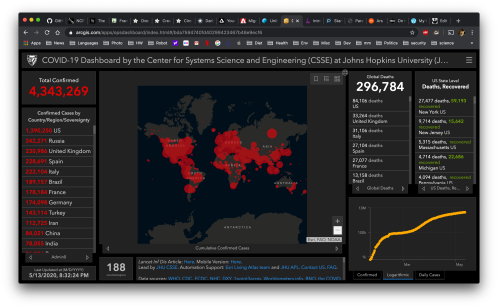
Once again, let’s quote some of today’s headlines.
Reports of mass graves as Latin America becomes new pandemic epicenter
In the last two months, deaths in Lima, Peru, doubled over historical averages. In Manaus, the capital of the Amazonas in Brazil, deaths for April reached about 2,800—three times the historical average. Gravediggers in the city reportedly stacked coffins three layers deep into mass graves to try to keep up with the body count.
In the port city of Guayaquil, Ecuador, deaths spiked to five-times the average—an increase comparable to the spike in deaths seen in New York City during the worst of its outbreak. Residents in Guayaquil were reportedly forced to leave dead bodies in cardboard boxes on the streets for days.
Whistleblower warns of “darkest winter” if Trump admin ignores science
While I am unfortunately no longer leading BARDA, I am an expert in these areas and fully understand the grave risks we are facing. I continue to believe that we must act urgently to effectively combat this deadly disease. Our window of opportunity is closing. If we fail to develop a national coordinated response, based in science, I fear the pandemic will get far worse and be prolonged, causing unprecedented illness and fatalities. While it is terrifying to acknowledge the extent of the challenge that we currently confront, the undeniable fact is there will be a resurgence of the COVID-19 this fall, greatly compounding the challenges of seasonal influenza and putting an unprecedented strain on our health care system. Without clear planning and implementation of the steps that I and other experts have outlined, 2020 will be the darkest winter in modern history.
New US coronavirus hotspots appear in Republican heartlands
https://www.theguardian.com/world/2020/may/13/new-us-coronavirus-hotspots-republican-heartland-areas
New coronavirus hotspots are emerging in Republican heartland communities across multiple states, contradicting Donald Trump’s claims that infection rates are declining across the nation.
At a fraught press briefing on Monday, the president declared: “All throughout the country, the numbers are coming down rapidly.”
Yet county-specific figures show a surge in infection rates in towns and rural communities in red states such as Texas, Tennessee, Alabama, Kentucky and North and South Dakota, according to data tracking by the New York Times.
Trump’s claim is also contradicted by data used by the White House’s own pandemic taskforce to track new and emerging hotspots.
In a 7 May report, obtained by NBC News, the list of top 10 surge areas included Nashville, Tennessee; Des Moines, Iowa; Amarillo, Texas; Racine, Wisconsin; Garden City, Kansas, and Central City, Kentucky – a predominantly white town of 6,000 people which saw a 650% week-on-week increase. Muhlenberg county, where Central City is located, has voted Republican in every presidential election since 2004, with Trump winning 72% of votes in 2016 – the biggest ever victory for the party.
The geographical spread of new hotspots suggest that the virus is advancing quickly outside major coastal towns and cities such as New York, Newark and Seattle where infection rates are now plateauing or dipping.
Many of the new emerging hotspots, both rural and urban, are in states where governors refused to issue stay-at-home orders, or are following Trump’s advice to relax lockdown restrictions despite public health warnings about the dangers of doing so too soon.
For some seniors, virus is shifting their views of Trump
Tommye and Rody Johnson have been registered Republicans for almost seven decades. So while the couple from Vero Beach, Florida, had some reservations about then-candidate Donald Trump in 2016, they just couldn’t imagine voting for Hillary Clinton.
Now, after nearly four years of President Trump’s tweets, the impeachment scandal, and especially, what they see as his disastrous handling of the COVID-19 pandemic, they can’t imagine voting for him again.
They’re not the only ones. According to a recent Morning Consult poll, Mr. Trump’s approval rating among voters over the age of 65 dropped 20 points between March and the end of April, making seniors more critical of the president’s performance than any other age group aside from 18- to 29-year-olds. Much of that decline seems directly related to the virus, which so far has posed a far more serious health threat to older people.

You must be logged in to post a comment.